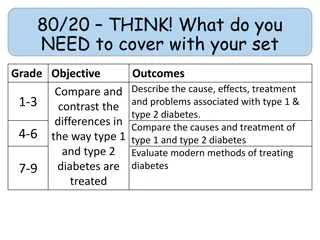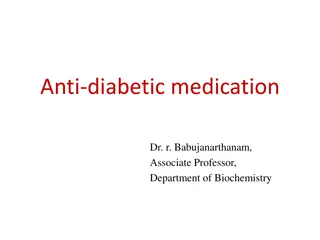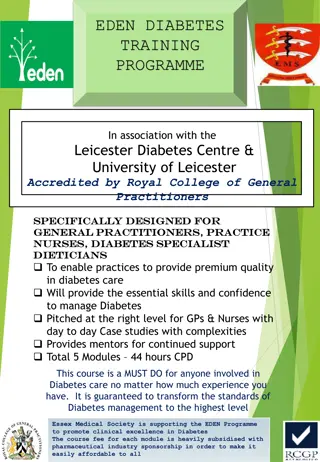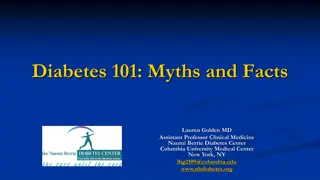Diabetes
Diabetes, a common disorder that affects the body's ability to manage blood sugar levels. Explore the different types of diabetes, the role of insulin, and the potential complications of the condition.
Download Presentation

Please find below an Image/Link to download the presentation.
The content on the website is provided AS IS for your information and personal use only. It may not be sold, licensed, or shared on other websites without obtaining consent from the author. Download presentation by click this link. If you encounter any issues during the download, it is possible that the publisher has removed the file from their server.
E N D
Presentation Transcript
Overview Diabetes is a relatively common disorder that involves the body s ability to manage blood sugar levels properly. Diabetes is not curable at this time, and without proper management can result in a wide range of complications.
Definition Type 1 Diabetes: This refers to a genetically based condition in which the cells in the pancreas that normally produce a hormone called Insulin stop functioning. This often appears in childhood or early adolescence. The only treatment for Type 1 Diabetes is insulin replacement (by pump or injection). Without adequate supplementary insulin, blood sugar levels dramatically increase and glucose spills over into the urine.
Definition Type 2 Diabetes: The primary problem in Type 2 Diabetes is a resistance to the normal effects of insulin, which is intended to facilitate the uptake of glucose (blood sugar) by the cells of the body. After many years of Type 2 Diabetes, many individuals eventually develop a deficiency of insulin as well as the resistance. Type 2 Diabetes most often appears in adulthood and is associated with obesity, though can occur in the non-obese as well. In recent years, there has been a significant increase in the number of adolescents with Type 2 Diabetes that is associated strongly with the increase in adolescent obesity.
Insulin Insulin is a hormone produced by cells in the Pancreas that enables cells in the body to take up blood sugar or glucose. Insulin acts much like a key in a lock. When insulin is present, it unlocks the mechanism that takes glucose into the cell where it can be used as a source of energy by the cell. When insulin is not present (Type 1 Diabetes), or is being blocked (Type 2 Diabetes), the cell is unable to absorb the available glucose. In that case, the level of glucose in the blood stream rises and eventually is excreted through the kidneys.
Complications of Diabetes Eyes (retinopathy: diabetes can cause damage to the small blood vessels in the retina of the eye. Over time, this can lead to blindness. This is a picture of some of the damage that can be caused in the eye by diabetes.
Complications cont. Kidney (nephropathy): The kidneys contain millions of tiny blood vessel clusters that filter waste from your blood. Diabetes can damage this delicate filtering system. Severe damage can lead to kidney failure or irreversible end-stage kidney disease, which often eventually requires dialysis or a kidney transplant.
Complications cont. Cardiovascular: In many ways, diabetes is fundamentally a disease of the blood vessels in the body. Over time, it is the damage to the small arteries that cause most of the significant complications of diabetes. This includes damage to blood vessels in: Eyes Kidneys Nerves In the extremities (feet and hands)
Complications cont. Nerve damage (neuropathy): Excess sugar can injure the walls of the tiny blood vessels (capillaries) that nourish your nerves, especially in the legs. This can cause tingling, numbness, burning or pain that usually begins at the tips of the toes or fingers and gradually spreads upward. Poorly controlled blood sugar can eventually cause you to lose all sense of feeling in the affected limbs. Damage to the nerves that control digestion can cause problems with nausea, vomiting, diarrhea or constipation. For men, erectile dysfunction may be an issue.
Complications cont. Some additional possible complications: Hearing impairment. Hearing problems are more common in people with diabetes. Skin conditions. Diabetes may leave you more susceptible to skin problems, including bacterial and fungal infections. Alzheimer's disease. Type 2 diabetes may increase the risk of Alzheimer's disease. The poorer your blood sugar control, the greater the risk appears to be. The exact connection between these two conditions still remains unclear.
Prevention of Diabetes The key to preventing diabetes is all about maintaining a healthy lifestyle. Even if you have diabetes in your family, diet and exercise can help you prevent the disease. If you've already received a diagnosis of diabetes, you can use healthy lifestyle choices to help prevent complications. And if you have prediabetes, lifestyle changes can slow or halt the progression from prediabetes to diabetes. The key lifestyle choices include: Eating a healthy diet Maintaining a healthy weight Staying physically active and fit.



































